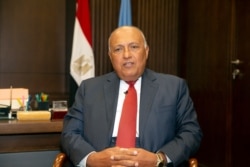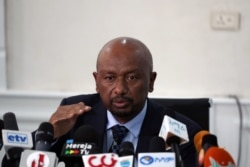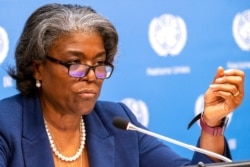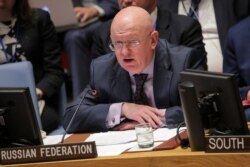The foreign ministers of Egypt and Sudan appealed to the U.N. Security Council on Thursday to intervene in their dispute with Ethiopia over the operation of a mega dam on the Nile River.
“We come here in search for a viable path towards a peaceful, amicable and negotiated solution, and to avert the dire consequences of our inability to reach a settlement to this matter,” Egyptian Foreign Minister Sameh Shoukry said.
“Our expectation is that this council will take the necessary measures to ensure the parties engage in an effective process of negotiation that could yield an agreement that serves our collective interests,” he added.
Tensions have escalated since Addis Ababa said Monday it had begun its second phase of filling the Grand Ethiopian Renaissance Dam — or GERD, as it is known. Downstream neighbors Egypt and Sudan object, insisting that a legally binding agreement that governs how the dam is filled and operated must first be in place.
“Silence from the council would send out the wrong message and would signify a tacit approval of the fact that this unilateral filling was acceptable,” Sudan’s foreign minister, Mariam al-Mahdi said.
The Nile flows northward, with one tributary (the White Nile) beginning in Lake Victoria, Uganda and the other (the Blue Nile) in Ethiopia. They merge in Sudan and continue flowing north to the Mediterranean Sea. Along the way, the river crosses through 11 countries, and populations have depended on its water for millennia.
Ethiopia started building the GERD in 2011 on the Blue Nile as a major hydropower project. Construction is nearly complete, and Addis Ababa says the dam will help bring electricity to 65 million Ethiopians who do not have it.
“We are dealing here with a hydroelectric dam. We are not building a nuclear plant,” said Seleshi Bekele Awulachew, Ethiopia’s minister for water, irrigation and energy. “It’s not the first of its kind in Africa or in the world.”
He urged the council not to become involved in the issue, which the African Union is mediating.
“If the council consents to the path preferred by Egypt and Sudan, it will certainly be entangled in resolving disputes on all transboundary rivers,” Ethiopia’s minister said.
After 10 years of negotiations, the three countries still have not resolved the situation. Council members urged them to find the political will and momentum to quickly resume substantive negotiations to resolve outstanding differences.
“A balanced and equitable solution to the filling and operation of the GERD can be reached with political commitment from all parties,” U.S. envoy Linda Thomas-Greenfield said. “Egypt and Sudan’s concerns over water security and the safety and operation of the dam can be reconciled with Ethiopia’s development needs.”
She said the African Union is the most appropriate body to address the dispute and that Washington would provide political and technical support. The U.N., the European Union and South Africa have also been involved as observers to these talks, which recently stalled.
Russia went a step further, proposing that the parties undertake a round of negotiations with the African Union chair while the three ministers are all in New York.
“We believe that this would be the best contribution the council could make to finding a solution to the situation,” Ambassador Vassily Nebenzia said.
Egypt and Sudan asked the council to adopt a resolution put forward by council member Tunisia. It demands that Ethiopia stop filling the dam and calls for the three countries to resume negotiations and reach a legally binding agreement within six months.
Sudan’s foreign minister acknowledged after the meeting that the council appeared to have little appetite to adopt the resolution.
But Cairo and Khartoum insist the issue is an important national security issue.
“This is a situation that Egypt cannot and will not tolerate,” Shoukry told the council.








